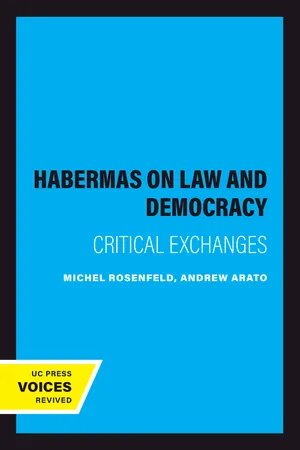
Philosophy, Social Theory, and the Rule of Law
Critical Exchanges
- 400 pages
- English
- ePUB (mobile friendly)
- Available on iOS & Android
Philosophy, Social Theory, and the Rule of Law
Critical Exchanges
About This Book
In the first essay, Habermas himself succinctly presents the centerpiece of his theory: his proceduralist paradigm of law. The following essays comprise elaborations, criticisms, and further explorations by others of the most salient issues addressed in his theory. The distinguished group of contributors—internationally prominent scholars in the fields of law, philosophy, and social theory—includes many who have been closely identified with Habermas as well as some of his best-known critics. The final essay is a thorough and lengthy reply by Habermas, which not only engages the most important arguments raised in the preceding essays but also further elaborates and refines some of his own key contributions in Between Facts and Norms. This volume will be essential reading for philosophers, legal scholars, and political and social theorists concerned with understanding the work of one of the leading philosophers of our age. These provocative, in-depth debates between Jürgen Habermas and a wide range of his critics relate to the philosopher's contribution to legal and democratic theory in his recently published Between Facts and Norms. Drawing upon his discourse theory, Habermas has elaborated a novel and powerful account of law that purports to bridge the gap between democracy and rights, by conceiving law to be at once self-imposed and binding. This title is part of UC Press's Voices Revived program, which commemorates University of California Press's mission to seek out and cultivate the brightest minds and give them voice, reach, and impact. Drawing on a backlist dating to 1893, Voices Revived makes high-quality, peer-reviewed scholarship accessible once again using print-on-demand technology. This title was originally published in 1999.
In the first essay, Habermas himself succinctly presents the centerpiece of his theory: his proceduralist paradigm of law. The following essays comprise elaborations, criticisms, and further explorations by others of the most salient issues addressed in h
Frequently asked questions
Information
Table of contents
- Cover
- Title
- Copyright
- CONTENTS
- ACKNOWLEDGMENTS
- Introduction Habermas’s Discourse Theory of Law and Democracy
- PART ONE Habermas’s Proceduralist Paradigm of Law
- ONE Paradigms of Law
- TWO Procedural Law and Civil Society Interpreting the Radical Democratic Paradigm
- THREE Law and Undecidability Toward a New Vision of the Proceduralization of Law
- FOUR Can Rights, Democracy, and Justice Be Reconciled through Discourse Theory? Reflections on Habermas’s Proceduralist Paradigm of Law
- PART TWO The Place of Legal Theory in Habermas’s Thought
- FIVE Legitimacy and Diversity Dialectical Reflections on Analytical Distinctions
- PART THREE Law’s Proceduralization The Communicative Model, Systems, and Order
- SIX Quod Omnes Tangit Remarks on Jürgen Habermas’s Legal Theory
- SEVEN De Collisione Discursuum Communicative Rationalities in Law, Morality, and Politics
- EIGHT Law and Order
- PART FOUR Law’s Reconstruction, Justification, and Application
- NINE Habermas and the Counterfactual Imagination
- TEN Jürgen Habermas’s Theory of Legal Discourse
- ELEVEN Communicative Freedom, Communicative Power, and Jurisgenesis
- PART FIVE Law, Ethics, and Democracy
- TWELVE Against Subordination Morality, Discourse, and Decision in the Legal Theory of Jürgen Habermas
- THIRTEEN Short-Circuit A Critique of Habermas’s Understanding of Law, Politics, and Economic Life
- FOURTEEN The Retrieval of the Democratic Ethos
- PART SIX Liberalism, Republicanism, and Constitutionalism
- FIFTEEN Family Quarrel
- SIXTEEN Communicative Power and the Concept of Law
- SEVENTEEN Constitutional Adjudication in Light of Discourse Theory
- EIGHTEEN The Dynamics of Constitutional Adjudication
- PART SEVEN Habermas Responds to His Critics
- NINETEEN Reply to Symposium Participants, Benjamin N. Cardozo School of Law
- Contributors
- INDEX